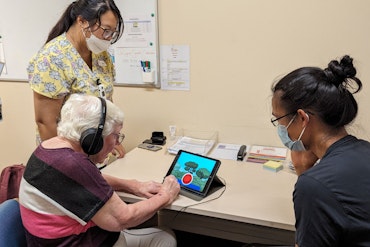Award-winning research study for major depression in palliative care
For some patients in palliative care, the future can seem grim or uncertain which may lead to a slump in their mood, apathy or symptoms associated with major depressive disorder (MDD).

Image courtesy of Creativa Images (via Shutterstock)
Palliative care is focused on treating those with advanced or terminal conditions by giving them the quality of life to fight from one day to the next.
For some patients in palliative care, the future can seem grim or uncertain which may lead to a slump in their mood, apathy or symptoms associated with major depressive disorder (MDD).
This year, the Cancer Symptoms Trials (CST) committee of the University of Technology has recognised Dr Wei Lee for his work in the field of improving quality of life for palliative care.
Dr Lee sought to treat those with MDD symptoms in palliative care by administering ketamine through controlled, electronic doses known as ‘subcutaneous infusions’.
The research study, conducted by HammondCare Palliative Care Staff Specialist and coordinating principal investigator Dr Lee, won him the CST Emerging Trialist Award for achievement.
Ketamine has earned a reputation as a ‘street drug,’ known also as ‘special k,’ which is used recreationally for its sedative and psychotropic qualities, but Dr Lee’s study has shown that the stigma associated with ketamine could overshadow the benefit to end of life care.
The award-winning research was carried out in 2022, with the results expected to be peer reviewed and published later this year.
Funding for the study was provided by Cancer Australia, which seeks to improve the lives of those living with the condition and support the ground-breaking research provided by investigators such as Dr Wei Lee..
“Major depression at end of life is so very sad for patients and those they love – they lose the care factor,” Dr Lee said.
The study was carried out across several locations, including HammondCare’s Braeside Hospital in collaboration with Braeside Palliative Care Director Dr Amy Chow.
Dr Lee raised $172,500 dollars to fund the study and brought together an investigative team, including consumers, to steer the research study to a successful conclusion.
“We know that if we give ketamine at a high rate it leads to hallucinations and weird sensory challenges and it does more harm than good.
“What we are learning now is that at super low doses it might help major depression symptoms without the side effects.”
Ketamine is used in veterinary treatments as an anaesthetic, but Dr Lee’s research determined that it was a successful rapid-onset antidepressant, in lieu of commonly prescribed treatments which take time to improve the mood and wellbeing of those afflicted.
Additionally, many prescribed antidepressants could have negative side effects for those with pre-existing conditions, frailty and organ dysfunction, which makes end of life treatment difficult for those living with MDD.
As a recipient of the CST Emerging Trialist Award, which is offered each year for outstanding research and contributions to improving the lives of people in Australia who live with cancer, the CST Scientific Advisory Committee Chair, Dr Belinda Butcher spoke to the dedication and effort Dr Lee showed.
“His work has provided us with some important methodological learnings for clinical trials for people living with cancer with short prognosis,” Dr Butcher said.
After receiving the award, HammondCare Senior Staff Specialist in Palliative Care Josephine Clayton congratulated Dr Lee for his work in improving the mental health of those dealing with MDD and cancer.
“Well done, Dr Lee, on this pioneering work on how to find better ways to treat difficult-to-manage depression in palliative care,” said Josephine Clayton.
For more information regarding HammondCare Palliative Care, please visit the website via the link.























